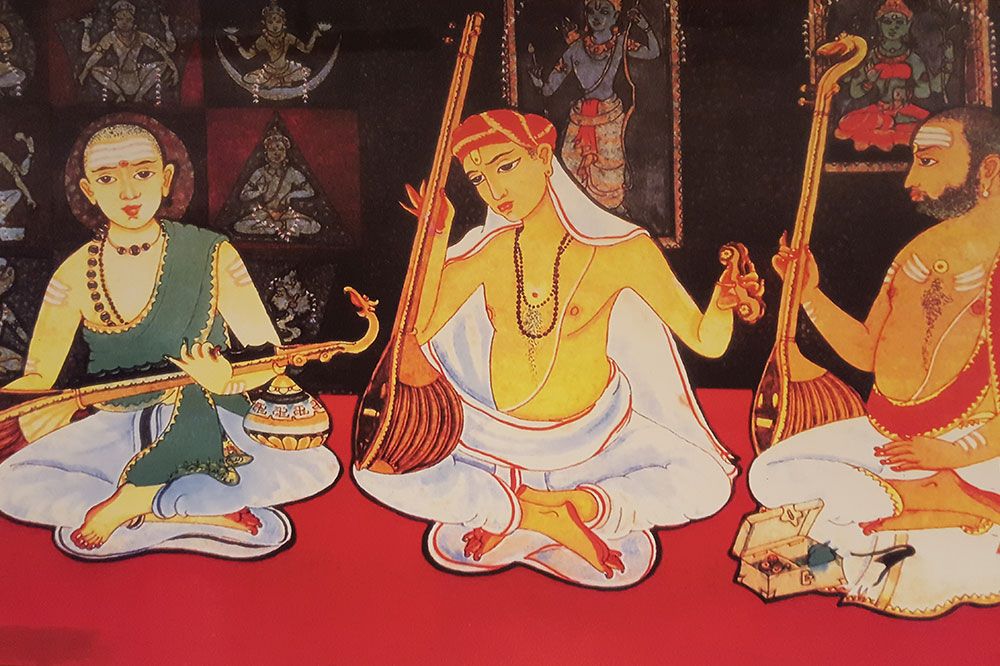Tyagaraja The Activist
It is common knowledge that TyAgarAja , as a RAma bhakta, has composed prolifically in praise of Lord Rama. He has also composed hundreds of compositions on many other deities. He has composed with music or bhakti as the central theme.
TyAgarAja is a vAggEyakara who has arguably used the greatest variety of themes in his compositions.
I am neither a language expert nor can I claim to have done extensive research on TyAgarAja’s compositions. But as I learn them, I try to understand the general meaning that they convey.
As I was trying to understand some of the kritis I learned, I was awed by the fact that his work contains lyrics that strike a chord with some of the social problems in today’s world. They are as relevant now, as they would have been when he poured his heart out into these kritis. TyAgarAja as an activist or reformer, speaks out through these four kritis that I have selected for this topic.
YagnAdulu SukhamanuvAriki samu-
LajnAnulu galarA O manasASujnAna daridra paramparula
Sura chittula jIvAtma himsagalaBahujanmambula vAsanayutulai
Ahi visha sama vishayAkrishtulai
BahirAnanulai TyAgarAju
Bhajiyinchu sri rAmuni deliyaka
In this kriti set in raga Jayamanohari, he condemns animal cruelty by bringing to attention the heinous act of animal sacrifice, which is illegal but prevalent in some communities even today. Animal sacrifice, which is the ritual killing of an animal to appease a certain deity, was described in the vedas. Ashvamedha or horse sacrifice is said to have been performed by ancient kings. Even today, this cruel act continues to be conducted in various parts of India in the name of religion. Tyagaraja says:
“O’ Mind! There are people who declare that sacrifices lead to prosperity and happiness. It is the height of ignorance to resort to such devilish observances involving cruelty to animals.”
To have a vision of this nature, when these acts were perhaps the norm, shows TyAgarAja’s compassion, immense wisdom and independent thought.
Kanukona sowkhyamu Kamalajukaina galgunA
Danuja vairiyagu RAmuni daya galgina yatanIvinA
TanuvokachO manasokachO Tagina vEshamokacho niDi
Janula nEchu vAriki JayamaunE Tyagaraju
In this beautiful Nayaki rAga kriti, Tyagaraja proudly says:
“I have had the unique privilege of having direct vision of Sri Rama. Even Brahma cannot aspire for such an honor. Unless there is harmonious integration of the body and mind oriented towards the Lord, one cannot succeed by merely putting on the garb of spirituality and imposing on others”.
I hear a reformer of the modern era speaking here. Don’t we come across so many such pseudo spirituals these days? Tyagaraja is confident that he attained the auspicious viewing of the Lord with single minded, concentrated, and unadulterated devotion, with no other goal other than being one with the Lord.
PadavinI sadbhaktiyu galgudE
CadivivEda shastrOpanishattula satta teliya lEnidi padaviyA?
DhanadAra sutAgAra sampadulu dharaNIsula chelimOka padaviyA?
JapatapAdi aNimAdi siddhulacE jagamula necUTa yadi padaviyA?
Raga lObhayuta yagnAdulacE bhOgalabbuta yadi padaviyA?
TyAgarAjanutudou srI rAmuni tatvamu deliyani oka padaviyA?
The last charaNam starting with “TyAgarAjanuta” is the only one generally sung in performances but I want to refer to the earlier passages here:
What contributes to one’s status? By status, or padavi, TyAgarAja means not the stature or popularity that one has in society but he is referring to what really matters as the ultimate mark of respect for a person. He asks:
Does mere lip service to the scriptures help? Does mere pretence of doing japa and practicing austerities contribute to status? Does it depend on the extent of wealth, wishes or closeness to royalty? Finally, he states that to be ignorant of the doctrines and principles preached and demonstrated by Sri RAma in his incarnation, detracts from the status of a person.
Vacchunu Hari ninnu jUda Vacchunu Hari ninnu joochi
Mecchunu Hari ninnu joochiKutsita vishayAdula cicchurIti nenchinIvu
HecchugAnumA swAmini macchikatO nutiyimpuYe japa tapamulaku rAdu yAjanAdulaku rAdu
rAjigAnutiyinchu tyAgarAjuni nIvela
The highlight of this kriti is the charaNam, where TyAgarAja declares that no amount of mindless chanting, meditation or penance will bring the Lord closer to you. He says, love the lord, and worship Him with all your heart, detesting worldly pleasures. The message seems contradictory, since we use japa and tapa to praise and show our love to the Lord. But one can guess the general sense that Tyagaraja is trying to convey is that, involving oneself in any kind of japa or puja to attract others’ attention, without real love for the Lord, is futile.
I am sure that there are many more and perhaps better examples of TyAgarAja’s awareness, compassion, and activist nature.
Musically and lyrically, the brilliance of TyAgarAja will undoubtedly stand the test of time.
Govinda Rao, T.K. (1995) Compositions of Tyagaraja. Chennai: Ganamandir Publications, 1995. pp, 322, 341, 376, 812
Rajeswari Satish

